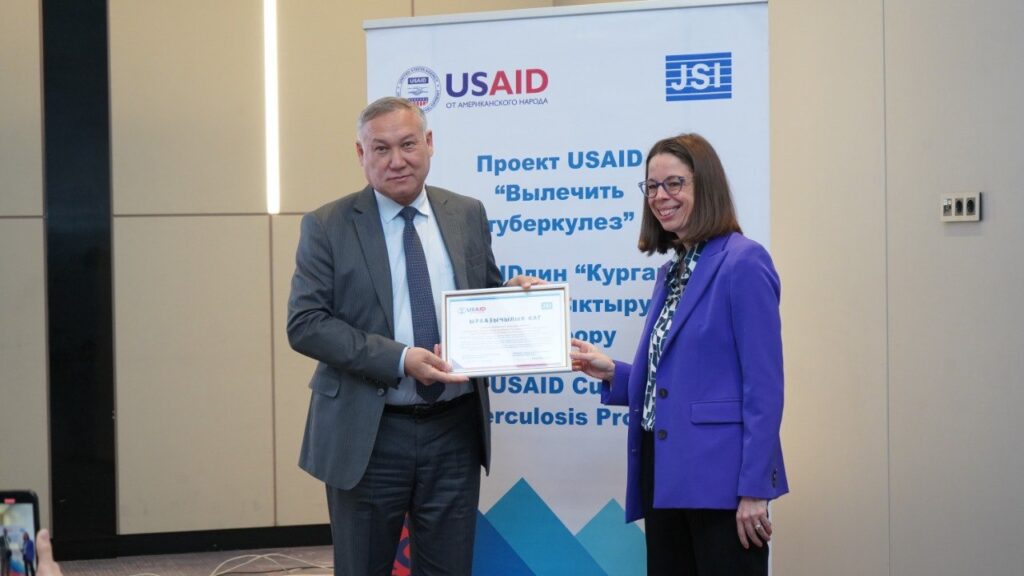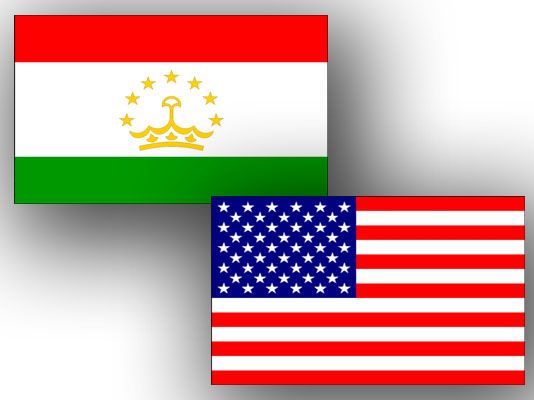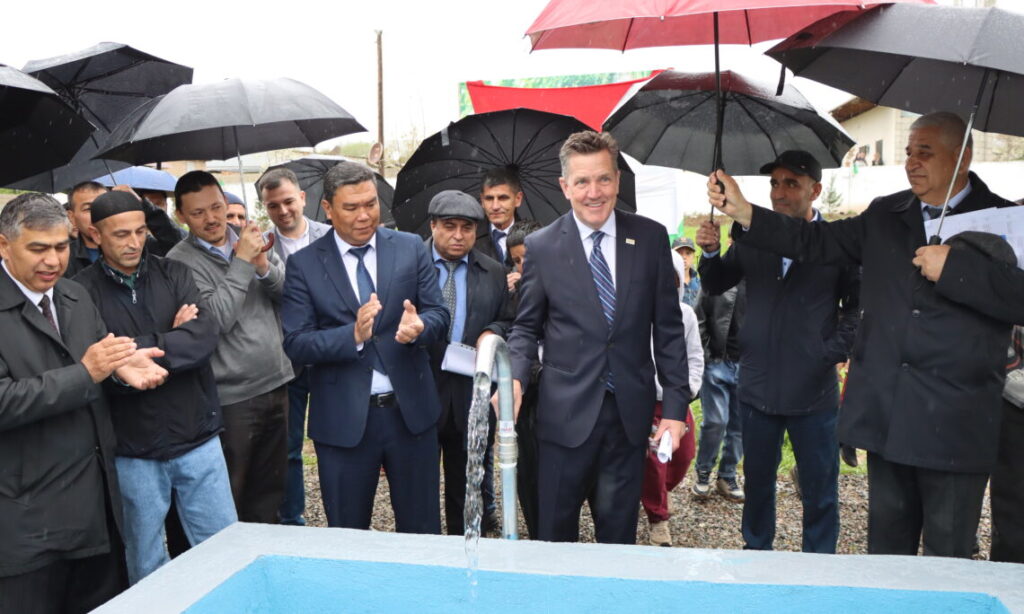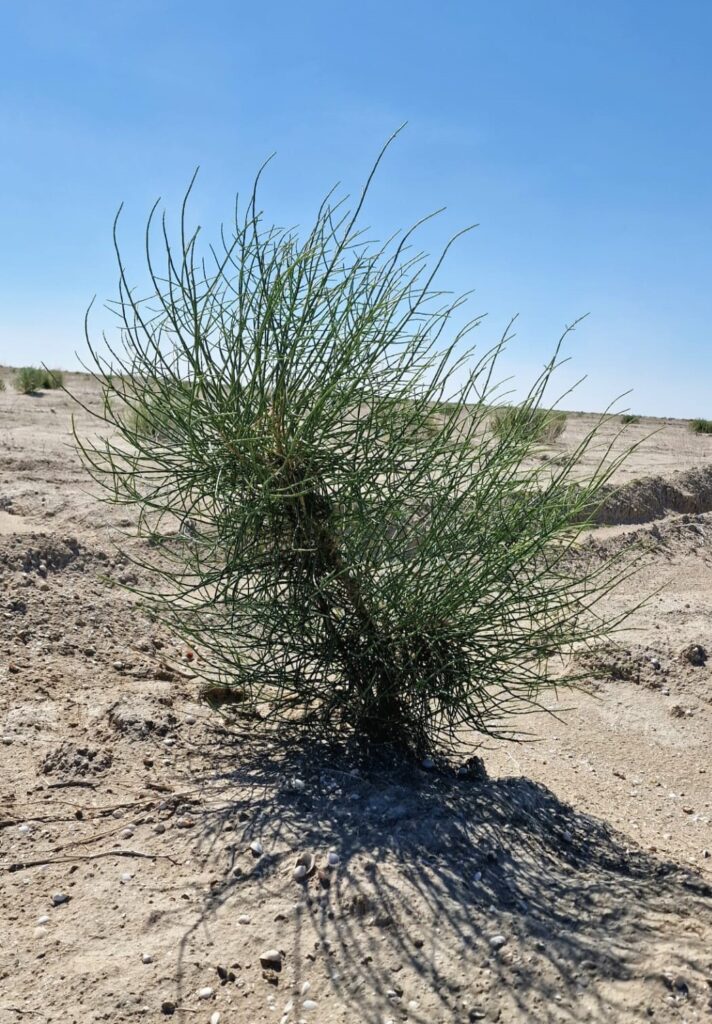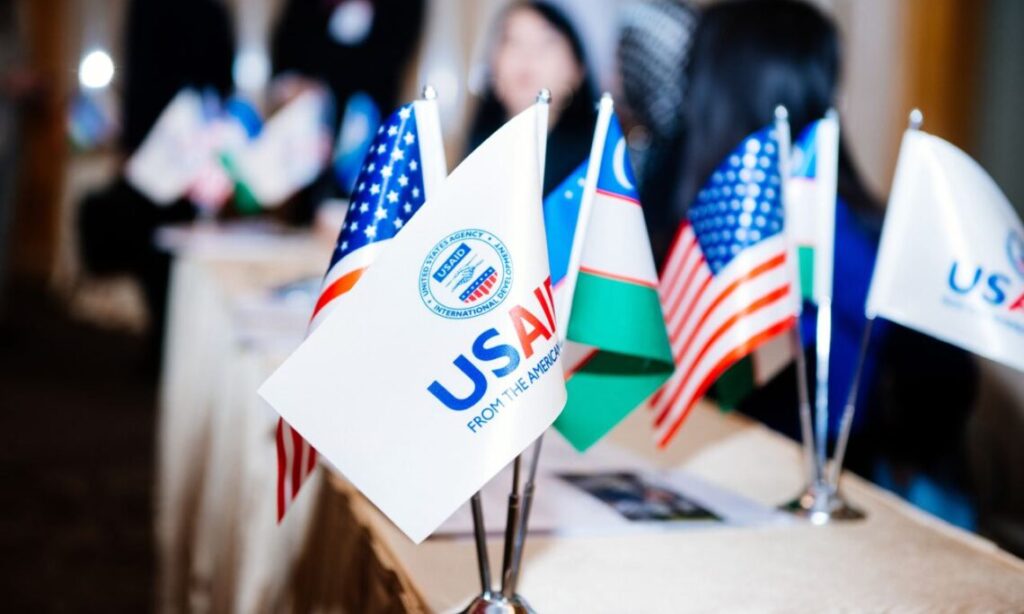Viewing results 1 - 6 of 7
U.S. Embassy Deputy Chief of Mission Liz Zentos and Kyrgyzstan’s Minister of Health Alymkadyr Beishenaliev, attended a national conference on 17 April to review the Cure Tuberculosis partnership. Since 2019, the U.S. government has invested more than $20 million in curing tuberculosis in Kyrgyzstan through the U.S. Agency for International Development (USAID). To date, the joint U.S.-Kyrgyz initiative has provided faster and more accurate tuberculosis diagnosis, improved treatment success rates, and increased community awareness and engagement in efforts to control tuberculosis, resulting in a decrease of tuberculosis mortality rates by over 33% and a reduction of cases by 37%. Praising the project’s success, Ms Zentos announced, “It is a collaborative effort that helped modernize tuberculosis diagnostics, improve patient-centred care, and reform the policy environment to improve tuberculosis treatment for all.” In turn, Minister Beishenaliev expressed gratitude to USAID for its ongoing aid, saying, “The Ministry of Health together with partners will continue to fight tuberculosis in Kyrgyzstan, develop a patient-centred model of tuberculosis care, support outpatient treatment in primary health care, introduce new diagnostic and treatment methods, develop and integrate tuberculosis information systems, and strengthen cooperation in tuberculosis prevention and care.”
On 18 April, the United States Agency for International Development (USAID) launched a new initiative to support long-term economic opportunities in Tajikistan. Running for five years at a cost of $18 million, Employment and Enterprise Development Activity (EEDA) will partner local firms to improve productivity in the fields of textiles, food processing and IT through the adoption of innovative, green technologies, increased investment, and market linkages. According to a report from the U.S. Embassy in Tajikistan, the project will create 5,000 permanent jobs, assist 200 business start-ups in accessing finance, and leverage $10 million in private sector investment. In his address at the launch, USAID Tajikistan Mission Director Peter Riley stated, “It is crucial to foster innovation, drive economic growth, and create sustainable employment opportunities within the public and private entities. These partnerships underscore the shared goal of advancing Tajikistan’s economic landscape and ensuring prosperity for all stakeholders.”
A new water supply system to provide safe drinking water for more than 3,000 people across 455 households has been inaugurated in the village of Rohati in Tajikistan’s Rudaki District. Supported by the United States Agency for International Development (USAID), it is but one of the 12 communities now furnished with rehabilitated water supply systems through public-private partnerships. To ensure the project’s sustainability, USAID helped Rohati’s private water operator develop a sound business plan for its water system, introduced electronic billing, and assisted with the installation of water meters in households. Speaking at the opening ceremony on April 12, USAID Tajikistan Mission Director Peter Riley stated, “The U.S. Government believes that everyone has the right to safe drinking water. USAID strives to increase access to safe drinking water across all regions of Tajikistan. Access to safe drinking water is of critical importance to protecting public health, dignity, equity, and our environment and USAID is committed to that goal.” In the last five years, USAID has rehabilitated and constructed 30 drinking water supply systems throughout Tajikistan, providing more than 100,000 people with safe drinking water.
The U.S. Embassy in Kazakhstan has announced that from 12 – 16 April, the United States Agency for International Development (USAID) will visit the Oasis project on the former shores of the Aral Sea in the Kyzylorda region of Kazakhstan. Launched in 2021, the Oasis is integral to Environmental Restoration of the Aral Sea Activity (ERAS-I); a larger initiative spawned by USAID in cooperation with the Executive Directorate of the International Fund for Saving the Aral Sea. Comprising a 500-hectare demonstration site for testing black saxaul shrubs, the project represents a first step in restoring the local ecosystem and demonstrates the willingness of governments, NGOs, and local communities to collaborate on building resilience against environmental threats to Central Asia. In advance of the expedition to commemorate the project’s success and celebrate the efforts of those who contributed to its realization, U.S. Ambassador to Kazakhstan, Daniel Rosenblum, stated: “The testing and research at the Oasis will benefit not only Kazakhstan communities in this region, but will also inform ecosystem restoration efforts throughout the Aral Sea region. Working together with national and international partners, we are proud to be part of this mission to find collaborative solutions to build climate resilience in Central Asia.” The Aral Sea disaster is one of the worst ecological catastrophes in human history. Formerly the fourth largest lake in the world, the Aral Sea began shrinking in the 1960s when water from the rivers that fed it was redirected for agricultural irrigation. Today, the Aral Sea is only 10% full. The subsequent birth of the Aralkum Desert and the sand and dust storms rising from the world’s newest desert have both polluted the environment and severely affected the health in local communities.
The U.S. Agency for International Development (USAID) has announced an investment of $17.7 million in a five-year Business Support Project in Uzbekistan. The project aims to enhance competitiveness in small and medium enterprises across four key sectors: information and communications technology (ICT), tourism, textiles, and the green economy. Created in partnership with the government of Uzbekistan and the private sector, the project’s two primary goals are to break down barriers affecting growth and increase investment in the private sector. By focusing on these objectives, the project seeks to create a more enabling environment for business expansion and innovation, thereby contributing to the overall economic prosperity of Uzbekistan. Speaking at the launch on March 5th, USAID Mission Director to Uzbekistan David Hoffman declared, “Today, we embark on a transformative journey with the Business Support Project. This initiative represents a pivotal moment in our shared pursuit of a prosperous, inclusive, and sustainable future for Uzbekistan. By addressing critical barriers to growth and leveraging the dynamism of the private sector, we aim to unlock new opportunities for businesses, especially those led by women and youth. Our collective efforts through our Business Support Project will pave the way for a more resilient and competitive economy, benefiting not just Uzbekistan but the entire region.”
According to a statement issued by the U.S. Embassy in Uzbekistan on February 29th, the United States Agency for International Development (USAID) is set to introduce a new initiative to support Uzbekistan’s clean energy objectives. Under Uzbekistan’s “Strategy for the Development of Renewable and Hydrogen Energy,” the region has a target to increase its generation of renewable energy (solar, wind, and hydro) by 25 percent by 2030, and carbon neutrality by 2050. To support the government’s goals and with the collaboration of the Uzbek Ministry of Energy and energy sector stakeholders, USAID has announced the launch a Green Hydrogen Hub. Edward Michalski, Acting Director of USAID Mission to Uzbekistan, reported, “USAID is committed to supporting the Central Asian countries in the pursuit of clean energy development and other energy priorities, as not just a goal, but a necessity.” By helping to further the energy sector’s expertise in clean energy technologies, the Hub will play an important role in shaping the region’s future energy landscape. A new curriculum on green hydrogen established by USAID in partnership with the University of Delaware, USA, and Tashkent State Technical University, has now been incorporated into a master’s degree program.


